Manor Lords: Tips and tricks
Manor Lords can seem chaotic at first. That's why we've put together a list of tips to help you get started with the game. We've described the buildings, roads, oxen and red icons, along with how to manage it all.
Last update:
Getting started in Manor Lords may be quite difficult, especially if you are not an RTS or citybuilder veteran. Therefore, based on our own experience and mistakes made, we have prepared a list of tips that will help you deal with the first problems you will face in this game. We describe in what order to place the buildings, what to pay attention to and explain why the oxen do not bring the wood to the right place.
- Start with the Rise to Prosperity scenario
- In what order should buildings be placed?
- Build roads from the beginning
- Build large fields near your houses
- Pay attention to the red icons
- Be careful when assigning an ox to a specific job
- Temporarily lay off workers when you want to build something
- Prepare supplies for the winter
- Have diverse food stocks
- Be careful when exploiting natural deposits
Start with the Rise to Prosperity scenario
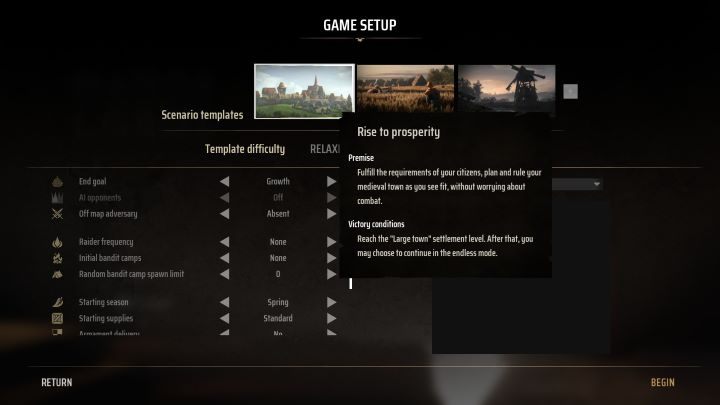
When starting a new game in Manor Lords, you will have several scenarios to choose from. If you are just starting your adventure with the game, we recommend the scenario on the left side of the list - Rise to prosperity. This scenario focuses on the development of the village and does not include combat - even if you do not want to finish it, it will allow you to familiarize yourself with the game's economic systems in less stressful conditions.
In what order should buildings be placed?
Of course, we encourage you to be creative in making your settlement, but we noticed that there are a few buildings that are worth building at the very beginning of the game. Moreover, the game itself, as part of its specific tutorial, tells you how to start creating a village.
- Basic houses - their construction will reduce the number of homeless people. Once they are built, you don't have to do anything else - the villagers will go to their new shelters themselves. It is possible that the villagers will stubbornly refuse to move home and the game will continue to consider them homeless - in this case, you must destroy the tents they are currently living in by clicking on them and selecting the Demolish option.
- Logging camp - you start the game with a small amount of wood, which is needed to build basic buildings. You need to build Logging Camp as soon as possible to ensure constant access to raw materials - Logging Camp costs two pieces of wood, so ignoring it may lead to an early softlock.
- Granary - used to store food. When the construction is completed, you must assign a family to operate this building, then your peasants will start bringing there the resources that lie in the middle of the village.
- Storehouse - has an identical function to Granary and works the same, but it stores building materials instead of food.
- Well - provides people with access to clean water. You only need one well per region, and you must build it over an underground river. Building a well doesn't cost much, but it has a positive impact on the morale of the settlement's inhabitants, which will attract more potential villagers.
- Marketplace - at the market, people will start setting up stalls and selling the products they have created to other villagers. This will increase the happiness of the inhabitants and the reputation of your settlement, thus attracting more people.
Build roads from the beginning
Although your peasants can move quite efficiently on grass, the construction of roads will definitely improve communication in the village. The peasants themselves, as well as those with an ox, simply move faster on roads. So make sure they have easy access to each building to speed up the expansion of your settlement. When choosing a place for a building, the game will show you where it should connect to the road using small circles on the four sides of the construction site. Building roads is free and immediate, as is removing them (to remove a road, you need to hold Alt in road building mode and then click on the part of the path you want to get rid of), so don't underestimate connecting buildings with them .
Build large fields near your houses
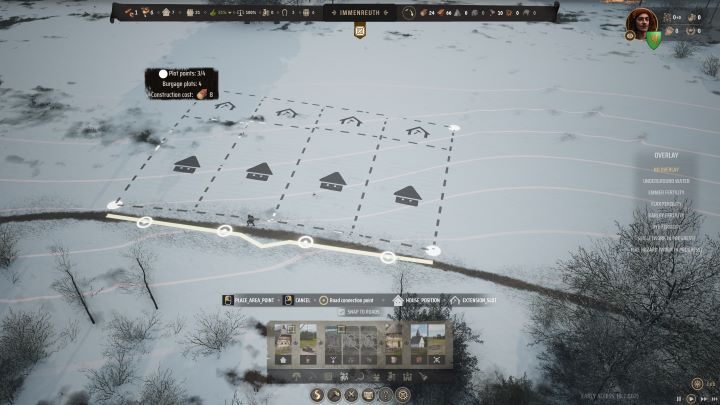
In Manor Lords, you build the basic house together with an adjacent plot of land. On each such plot, you can later add extensions, e.g. chicken coops or a brewery. Therefore, try to allocate a relatively large amount of space for them, so that you have room to build additional buildings, because only there you can produce some of the resources needed for the development of the village. For example, only villargers assigned to houses with extension are able to produce ale, which is necessary for the operation of the tavern. Additionally, they will support the village in feeding your peasants. So take care of the space for your people, because thanks to this the entire village will function better.
Pay attention to the red icons
Red icons will start appearing at the top of the screen, under the name of your settlement right from the beginning of the game. They indicate what problems your village is struggling with and you should deal with them first. These may include, for example, homelessness, lack of a sufficient number of oxen, or lack of basic resources such as wood or food. In addition to the icons having a warning function, by observing them you can more easily make your village self-sufficient, ensuring that all the needs of the inhabitants are met.
Be careful when assigning an ox to a specific job
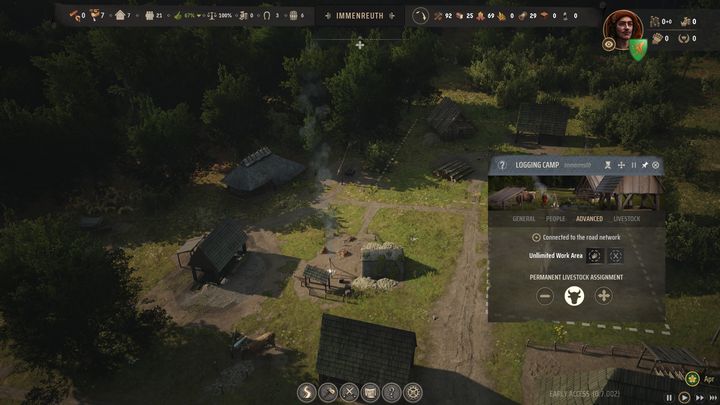
Every construction must start with bringing wood to the construction site, and only the ox can transport wood (at least at the beginning). So be careful not to get stuck in a situation where you inadvertently assign your only ox to a specific job, e.g. at a sawmill, meaning it will not be able to handle other tasks. If you are stuck in a situation where you have started construction but nothing is happening even though you have assigned workers to it, check if your ox is doing something else.
Temporarily lay off workers when you want to build something
The construction of buildings in Manor Lords requires workers. The construction is carried out by your unemployed people - residents who are not assigned to work in any building. If all your settlers are busy, the construction process will not be able to proceed. While it may be tempting to keep a few settlers unemployed, being unemployed for too long negatively affects your village's reputation - so a better idea would be to temporarily relieve some of your settlers of their positions when you need to build something and reassign them to a given building once the construction process is complete.
Prepare supplies for the winter
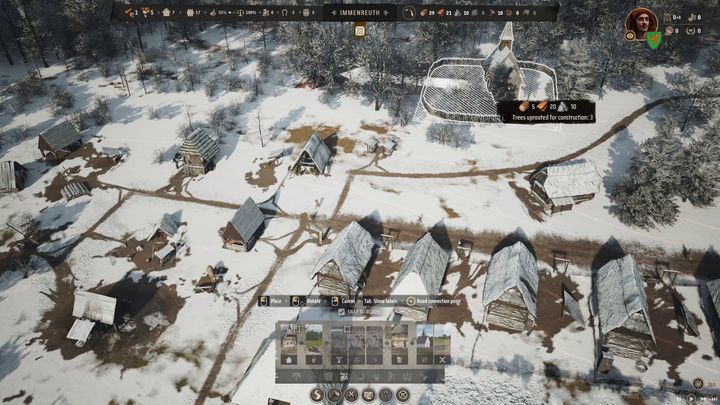
During the freezing winter months, your villagers will use twice as much wood and food. It will therefore be extremely important to prepare appropriate supplies that will help the village survive this difficult period. The game will warn you about the upcoming season with an appropriate message, but you should start preparations earlier. Delegate more people to produce fuel and food. Also remember that in winter it is impossible to work in the field, so your only source of food will be hunting and animal husbandry.
Have diverse food stocks
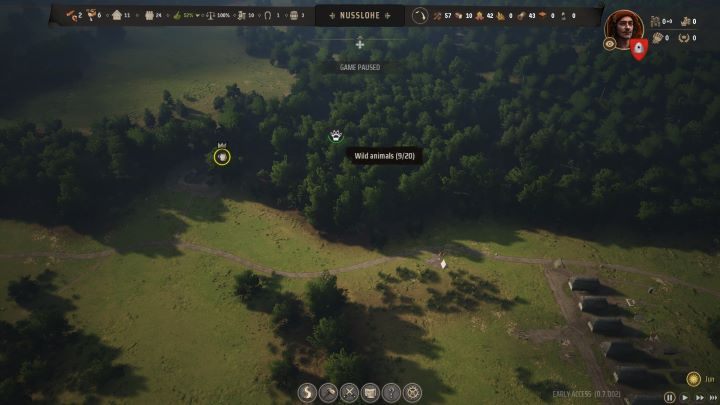
You need a constant supply of food if you want your settlement to survive. There are different types of food in the game - meat, bread, vegetables, fruit, honey. Try to diversify the food for the villagers - build farms, hunters' huts, create vegetable gardens and chicken coops near residential houses. A variety of food will increase the happiness of your people, encourage people to settle in your village, and ensure that they do not starve in the event of a sudden crisis, such as the arrival of winter or the extinction of a population of animals.
Be careful when exploiting natural deposits
Many raw materials in Manor Lords are obtained by through natural deposits - e.g. building mines near stone deposits or building hunting huts near animal herds. However, these deposits may disappear due to excessive exploitation - e.g. excessive hunting or cutting down nearby forests. Don't be overzealous - order hunters to stop hunting when the animal population reaches a certain level and build Forester Huts, whose workers plant new trees after cutting down the old ones.
You are not permitted to copy any image, text or info from this page. This site is not associated with and/or endorsed by the developers and the publishers. All logos and images are copyrighted by their respective owners.
Copyright © 2000 - 2025 Webedia Polska SA for gamepressure.com, unofficial game guides, walkthroughs, secrets, game tips, maps & strategies for top games.
